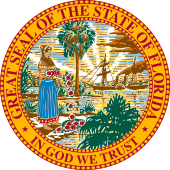Florida state legislature
| Florida Legislature | |
|---|---|
| 2016-18 Florida Legislature | |
 |
|
| Type | |
| Type | |
| Houses |
Senate House of Representatives |
| History | |
| Founded | May 26, 1845 |
| Preceded by | Legislative Council of the Territory of Florida |
|
New session started
|
March 7, 2017 |
| Leadership | |
| Structure | |
| Seats | 40 senators 120 representatives |
|
Senate political groups
|
Republican Party: 24 Democratic Party: 15 |
|
House political groups
|
Republican Party: 79 Democratic Party: 41 |
| Authority | Article III, Florida Constitution |
| Salary | $29,697/year + $152 per diem |
| Elections | |
|
Last general election
|
November 8, 2016 |
|
Next general election
|
November 6, 2018 |
| Redistricting | Legislative control |
| Motto | |
| In God We Trust | |
| Meeting place | |
 |
|
| Florida Capitol (Old Capitol in foreground), Tallahassee | |
| Website | |
| www.leg.state.fl.us | |
The Florida Legislature is the two houses that act as the state legislature of the U.S. state of Florida. The Florida Constitution states that "The legislative power of the state shall be vested in a legislature of the State of Florida," composed of a Senate and House of Representatives. The legislature is seated at the Florida State Capitol in Tallahassee. Both chambers have been under Republican control since 1996.
The Legislature is composed of 160 state legislators (120 in the House and 40 in the Senate). Members are term-limited to eight consecutive years; however, there is no limit on the total number of terms (after sitting out two years, a member may run again). The state legislature meets beginning in March for a period not to exceed 60 calendar days. Special sessions are called as needed.
Its statutes, called "chapter laws" or generically as "slip laws" when printed separately, are compiled into the Laws of Florida and are called "session laws". The Florida Statutes are the codified statutory laws of the state.
The Florida Legislature is authorized by the Florida Constitution to create and amend the laws of the U.S. state of Florida, subject to the governor's power to veto legislation. To do so, legislators propose legislation in the forms of bills drafted by a nonpartisan, professional staff. Successful legislation must undergo committee review, three readings on the floor of each house, with appropriate voting majorities, as required, and either be signed into law by the governor or enacted through a veto override approved by two-thirds of the membership of each legislative house.
...
Wikipedia
